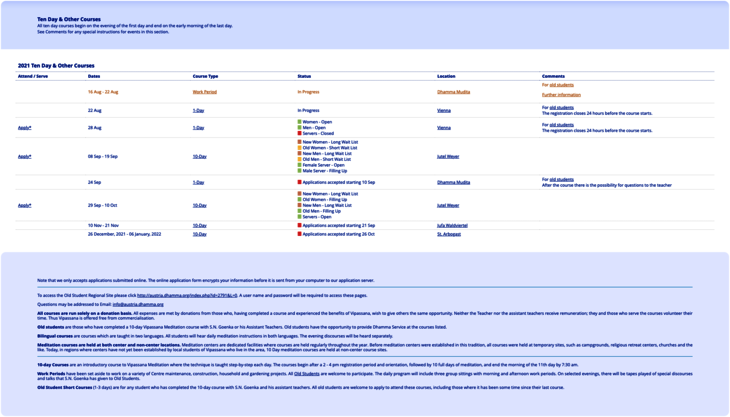How to learn Vipassana Meditation
The technique of Vipassana Meditation is taught at 10-day residential courses during which participants learn the basics of the method, and practice sufficiently to experience its beneficial results. There are over 170 Vipassana meditation centres all over the world.
The technique of Vipassana meditation is taught in 10-day courses where participants learn the basics of the method and practice enough to experience its positive results for themselves. There are over 240 Vipassana meditation centers around the world, offering 10-day courses in over 50 languages. So far, the courses in Austria have been held in various rented locations (e.g. JUFA hotels). From May 2025, the courses will now take place at the Dhamma Mudita centre in Rechberg, Upper Austria, which will enable regular courses throughout the year. For the time being, the courses will be comparatively small, with up to 50 participants and around 10 helpers. The participants will be accommodated in the new buildings of the first construction phase. By using it exclusively as a place for meditation, where only people who want to help themselves and others are present, a pure, peaceful, compassionate atmosphere is created on the center grounds, which is the best possible support for the practice of meditation. Also, donations from meditators are no longer wasted on paying high rents, but are used exclusively for the operation and expansion of the meditation centre.
After reviewing the Code of Discipline and checking the course schedule for available courses, you may apply for a course online.
Courses are run solely on a donation basis. There are no charges for the courses, not even to cover the cost of food and accommodation. All expenses are met by donations from those who have completed a course, experienced the benefits of Vipassana, and wish to give others the same opportunity. Neither the teachers nor the assistant teachers or other helpers on a course receive remuneration.
Vipassana is not connected with any religious organization. The courses are non-sectarian and non-discriminatory, open to all, irrespective of religion, caste, gender or socio-economic status. Anyone aged 18 or older may apply for a course. Special courses for children and teenagers are offered for younger people.


